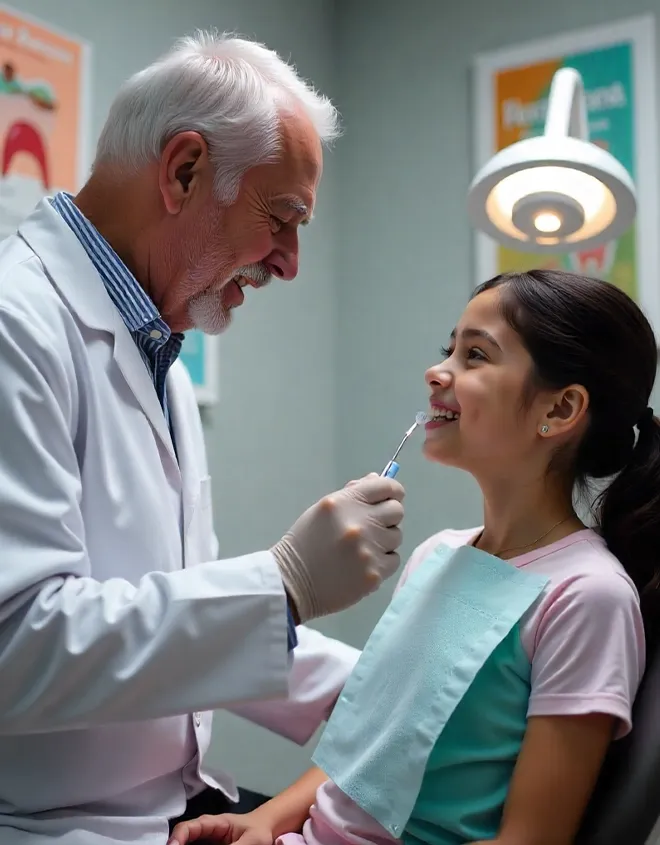Brushing Isn’t Enough: Why Your Dentist May Recommend Topical Fluoride Treatments
30 September 2025

Is Brushing Enough to Prevent Cavities?
The question often asked is: Is brushing enough to prevent cavities? While brushing with fluoride toothpaste remains essential, it may not be sufficient for everyone. Cavities, or dental caries, form when acids weaken tooth enamel, creating small openings where decay begins. For individuals prone to frequent cavities, or those with weakened enamel, brushing alone may not give lasting protection.
Even when someone brushes and flosses regularly, dietary habits, genetic factors, and saliva composition can still contribute to enamel breakdown. This explains why preventive fluoride care is often recommended for both children and adults.

What Is Topical Fluoride and How Does It Work?
Many wonder: what is topical fluoride? Topical fluoride refers to professional applications such as fluoride varnish, fluoride gel, or similar treatments applied directly to teeth during a dental visit. Unlike systemic fluoride, which enters the body through water or supplements, topical fluoride works on the tooth surface.
When applied, it strengthens tooth enamel through a process known as tooth remineralization. By depositing minerals back into weakened enamel, topical fluoride makes teeth more resistant to decay. Research has consistently shown that these treatments reduce the risk of dental caries, especially when paired with daily brushing.
How Does Fluoride Add Protection Beyond Brushing?
It’s important to address the question: how does fluoride add protection beyond brushing? Toothpaste fluoride concentrations are limited by safety guidelines for daily use. Professional fluoride treatments, such as gels or varnishes, contain higher levels of sodium fluoride, delivering deeper and longer-lasting protection.
Fluoride Beyond Brushing: Extra Protection for Adults
For many adults, the question arises: how does fluoride help if I already brush? The answer lies in the difference between daily maintenance and enhanced protection. Brushing cleans the teeth and provides a small dose of fluoride from toothpaste. However, professional treatments deliver a higher concentration, offering enhanced enamel protection that brushing alone cannot achieve.
This added shield is particularly valuable for cavity-prone adults, individuals with dry mouth, or those who consume high-sugar diets. A professional application of sodium fluoride or varnish can slow down enamel breakdown and protect vulnerable areas. In short, dentist-recommended fluoride acts as a supplement to brushing, not a replacement.
Fluoride vs Regular Brushing
It’s natural to compare fluoride vs regular brushing, but they are not competing methods. Brushing remains the foundation of oral hygiene, while topical fluoride after cleaning provides reinforcement. Think of brushing as daily defense and fluoride treatment as an extra layer of armor.
For instance, during a routine dental cleaning, plaque and tartar are removed, leaving teeth temporarily exposed. Applying topical fluoride immediately afterward ensures that freshly cleaned enamel receives maximum protection, sealing it against acid attacks.
Why Do Dentists Recommend Fluoride?
The common question: Why do dentists recommend fluoride? Has a straightforward answer. Decades of studies support fluoride’s ability to reduce cavities and strengthen enamel. While brushing does its part, professional dental treatment with fluoride can significantly lower cavity rates in adults who face ongoing risks.
ADA (American Dental Association) guidelines emphasize the importance of fluoride in preventive care. For adults, this recommendation often comes after a history of cavities, gum issues, or signs of enamel erosion. The role of fluoride is not limited to children; adults continue to benefit from treatments throughout life.

Should I Get Fluoride Treatment as an Adult?
Another concern people have is: Should I get fluoride treatment as an adult? The answer depends on oral health history, diet, and cavity risk level. Many adults who receive fluoride treatment for adults experience fewer cavities over time. Treatments like fluoride varnish are quick, painless, and designed to reinforce teeth that may already be under stress from daily wear.
While brushing reduces bacteria, topical fluoride adds resilience. Adults who have crowns, bridges, or exposed roots often benefit the most because those areas are more susceptible to decay.
(Disclaimer: Individual needs vary. Always consult a professional before deciding on any preventive treatment.)
Topical Fluoride After Cleaning
During routine dental cleanings, teeth are polished and free of buildup. This creates the perfect environment for applying topical fluoride after cleaning. In this state, fluoride penetrates more effectively into enamel, aiding tooth remineralization and strengthening areas that brushing alone cannot reach.
By combining cleaning with fluoride, patients receive both the removal of harmful deposits and the addition of protective minerals. This strategy shows why brushing is only the first step and why fluoride beyond brushing is emphasized in preventive care.
These treatments act against dental caries by hardening enamel and reversing early signs of decay. In some cases, early enamel lesions can even be stabilized through this process, preventing them from progressing into full cavities. Brushing cannot achieve this level of reinforcement on its own.
Fluoride for Stronger Teeth: A Lifelong Benefit
The idea of fluoride for stronger teeth often makes people think only of children. But in reality, enamel is constantly challenged throughout life by acids and bacteria. Adults who incorporate preventive fluoride care into their oral health routine continue to experience lasting benefits.
Strong enamel reduces tooth sensitivity, resists cavities, and supports overall dental health. With the addition of fluoride treatment for adults, brushing habits gain an ally in ensuring teeth remain functional and healthy for decades.
Conclusion
Brushing twice daily is vital, but brushing isn’t enough on its own for complete cavity prevention. Professional topical fluoride treatment provides protection that toothpaste and regular brushing cannot achieve alone. Through processes like tooth remineralization, fluoride strengthens tooth enamel, reduces the risk of dental caries, and supports oral health across all ages.
For adults, the importance of fluoride beyond brushing lies in its ability to offer enhanced enamel protection and supplement daily routines. Questions such as should I get fluoride treatment as an adult or why do dentists recommend fluoride are answered by the evidence showing its role in reducing cavities and strengthening enamel over time.
If you’ve ever wondered how does fluoride help if I already brush, the answer is simple: it gives your teeth extra strength and defense. Explore whether fluoride treatment for adults is right for you by discussing it during your next professional dental checkup.
Resource:
Restoring Smile: Exploring Diverse Options Beyond Dental Bridges.
Disclaimer
*This media/content or any other on this website does not prescribe, recommend, or prevent any treatment or procedure. Therefore, we highly recommend that you get the advice of a qualified dentist or other medical practitioners regarding your specific dental condition. *
